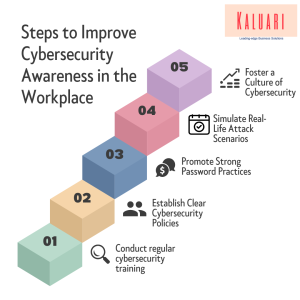Protecting your business from cyber threats is now more critical than ever. Cyberattacks are becoming more sophisticated, and without the proper defenses, businesses face financial loss, reputational damage, and operational downtime. Here are ten essential cybersecurity practices that every business should implement to strengthen its cybersecurity posture.
Related: The Evolution of Cyber Threats: Trends and Predictions for 2024
1. Employee Training and Awareness
Employees are often the weakest link in a company’s cybersecurity defenses. Phishing attacks, social engineering, and other scams target employees directly, making cybersecurity training essential. Training programs should educate employees on identifying threats, reporting suspicious activities, and following security protocols. Training also helps reduce human error, which is responsible for many breaches.
2. Implement Strong Password Policies
Weak or reused passwords are a common entry point for cybercriminals. Encourage employees to use strong, unique passwords for every account. A good password policy should include letters, numbers, and special characters. Implementing multi-factor authentication (MFA) is another layer of protection that requires users to verify their identity using two or more authentication factors.
3. Regular Software and System Updates
Cybercriminals exploit vulnerabilities in outdated software and systems. Ensure all operating systems, software, and applications are updated regularly to patch security flaws. Automating updates or setting reminders can help keep systems secure without manual intervention. This practice applies to hardware like routers, which can be exploited if unsecured.
4. Secure Your Network
A secure network is crucial for preventing unauthorized access. Businesses should use firewalls, virtual private networks (VPNs), and encryption to protect their data. Implementing secure Wi-Fi with encryption protocols, such as WPA3, and segmenting your network to isolate sensitive data will further enhance your cybersecurity defenses.
5. Regular Data Backups
Regular backups are vital to mitigate the impact of ransomware attacks or data corruption. Businesses should back up critical data daily or weekly and store these backups securely, preferably offsite or in the cloud. Automated cloud backups can ensure continuity even if a breach occurs.
6. Limit Access to Sensitive Data
Not all employees need access to all data. Adopt the principle of least privilege (PoLP), which ensures that users only have access to the systems and data necessary for their job roles. Limiting access reduces the risk of internal threats and the potential damage caused if an employee’s account is compromised.
7. Use Encryption for Data Protection
Encryption helps protect data, both in transit and at rest. Even if cybercriminals intercept the data, encryption ensures they cannot read or misuse it. Implement end-to-end encryption for sensitive communications, file transfers, and data storage, particularly for customer information, financial data, and intellectual property.
8. Conduct Regular Security Audits
Regular cybersecurity audits help identify weaknesses in your security posture. Conduct internal audits or hire external experts to assess your network, devices, and security policies. Vulnerability assessments and penetration testing can help you proactively address potential threats before cybercriminals exploit them.
9. Develop an Incident Response Plan
Having an incident response plan (IRP) ensures your business can act swiftly in the event of a cyberattack. This plan should outline the roles and responsibilities of each team member during a breach, the steps to contain the attack, and how to restore operations quickly. Regularly test and update your IRP to ensure it remains effective as your business grows.
10. Monitor Network Activity
Constant network traffic monitoring can help detect unusual activity that could signal a cyberattack. Implementing intrusion detection and prevention systems (IDPS) lets you spot potential threats in real-time. Logging network activity can also provide valuable forensic information in a breach.
Read Also: 9 Signs Your Business Needs a Disaster Recovery Plan
Conclusion
As cyber threats evolve, businesses must stay vigilant and proactive about their cybersecurity strategies. By implementing these ten essential cybersecurity practices, your business can significantly reduce the risk of cyberattacks and protect valuable data. Whether it’s employee training, secure networks, or regular audits, a comprehensive approach to cybersecurity is crucial for maintaining business continuity and safeguarding against cyber threats.
Prioritizing cybersecurity as a core component of your operations will ensure your business remains resilient in today’s digital world.





Pingback: Cost-Effective Cybersecurity Measures For Small Business